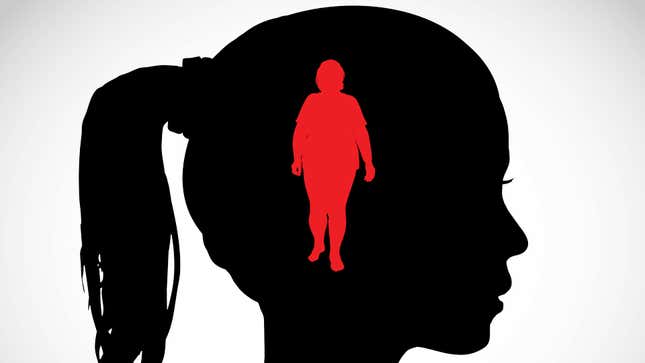Feeling Bad About Your Weight Is Making You Fat
Latest

And now, your cruel self-fulfilling prophecy of the day — teenage girls who wrongly think they’re too fat are much more likely than their peers with undistorted body images to become overweight twentysomethings. In other words, having crappy self esteem when you’re a kid is now something that can produce long-term health effects. Where, oh where could this body image mangling come from?
The study, conducted by Norwegian researchers, published in the Journal of Obesity, and reported on in The Telegraph, collected data on 1,200 individuals when they were teens, and then again 11 years later as adults. Teen participants were asked to comment on how they perceived themselves on a scale of thin to “chubby” or “very fat.” Fast forward to a decade and change later, and 60% of the normal sized girls in the study who thought they were fat had actually gone on to become overweight twentysomethings. Only 31% of non-overweight girls who didn’t think they were fat ended up with elevated BMI as adults. Boys fared slightly better — 63% of normal sized boys who wrongly perceived themselves to be “very fat” went on to become overweight young adults, but then again so did half of the boys who had accurate perceptions about their weight.
Researchers surmise that the discrepancy between long-term health effects on girls and long-term health effects on boys is due, in part, to the fact that teenage girls who think they’re fat will do terribly unhealthy shit in order to “fix” themselves. Eating disorders are an extreme example, but researchers noted that girls are more likely to do metabolism-screwing things like skip meals, deprive themselves of food, and eat unbalanced diets. Over the long haul, reacting to imaginary fat can lead to actual, real fat, which can lead to a whole host of negative long term lifestyle and health effects.
Of course, the study’s not completely perfect — it relies on BMI as a measure of health, which has been debunked so hard by so many people that it it were in a boxing match, its coach would be urging it to throw in the towel. But the Norwegian researchers did track the presence of belly fat when they checked in with their subjects as adults, which other studies have found to be associated with long-term ill health effects, and found a positive correlation between waistline and misplaced teenage neuroticism.
It’s not clear that negative teenage self-talk causes adult weight gain or if it’s just positively correlated; it’s possible that the regular sized teenage girls who thought they were fat were just miming the attitude their parents have about their own bodies. Overweight mothers constantly talking about how negatively they feel about their own bodies may influence their daughters with their attitudes when they’re teenagers, and with their genes by the time their daughters are adults.
But other factors could be in play as well. In fact, I’d be willing to bet that at least some girls’ warped visions of reality can be attributed to consumption of pop culture that trumpets extreme thinness as the only normal, acceptable way to look. Celebrity rags that circle tiny areas of cellulite on movie stars’ bodies and bash them for being NOT BEACH READY? Giant billboards featuring bony-armed teenagers looking really bummed that they’re sailing on a boat wearing Ralph Lauren clothes (maybe they’re sad because in the event of an emergency, no one on the boat has the upper body strength to adjust the sails)? Already-thin C list celebs hawking weight loss products in the back of fashion magazines? “Fitness” magazines that actually promote thinness rather than strength? Fashion magazines in general?
I know that when I was a kid, I didn’t realize that I was supposed to be feeling shitty about my body until my Luddite parents finally caved and got a satellite dish when I was in high school. We weren’t technically allowed, but my siblings and I would watch MTV almost constantly, and I didn’t realize how it was subtly influencing my or my siblings’ perception of what was “normal” or “pretty” until one summer day when I was 15 and about to go on a run in a sports bra and shorts. And as I was putting my hair into a ponytail, my little sister (who was 9) traipsed up to me in the kitchen and said, “Erin, you really need to work on your abs.” I could hear MTV Jams playing in the basement as I looked down and saw that my multiple sport-playing body, which still fit into clothes from the kids section, indeed did not have the jutting hip bones or carved muscles sported by music video girls. Maybe I did need to work on my abs.
Almost every woman I know has their moment looking at something in pop culture and thinking “Holy shit! I’m a land whale!” A coworker noted that when she was growing up, beer commercials and sex comedies always featured women wearing high-cut swimsuits that showed off the hips. Another coworker recalls looking at Kate Moss and feeling conflicted over the fact that she thought Moss, in all of her heroin chic glory, looked amazing. When the British press characterized Baby Spice as the “chubby” one. The Britney Spears/Christina Aguilera/Mandy Moore/Jessica Simpson bonerwars of the nineties.
This isn’t to blame thin people for teenage girls’ poor self esteem and subsequent struggles with weight; in many cases, thin people are just put together that way. But when a culture promotes thinness as the only acceptable standard of beauty (in some cases, the sort of thinness that’s only naturally attainable by the tiniest sliver of the tiniest sliver of the population) that is leading to real health problems, it’s time to consider what sort of self esteem mindfucks we’re exposing our teenagers to every day. It sticks around.
Image by Jim Cooke, source photos via /Shutterstock.